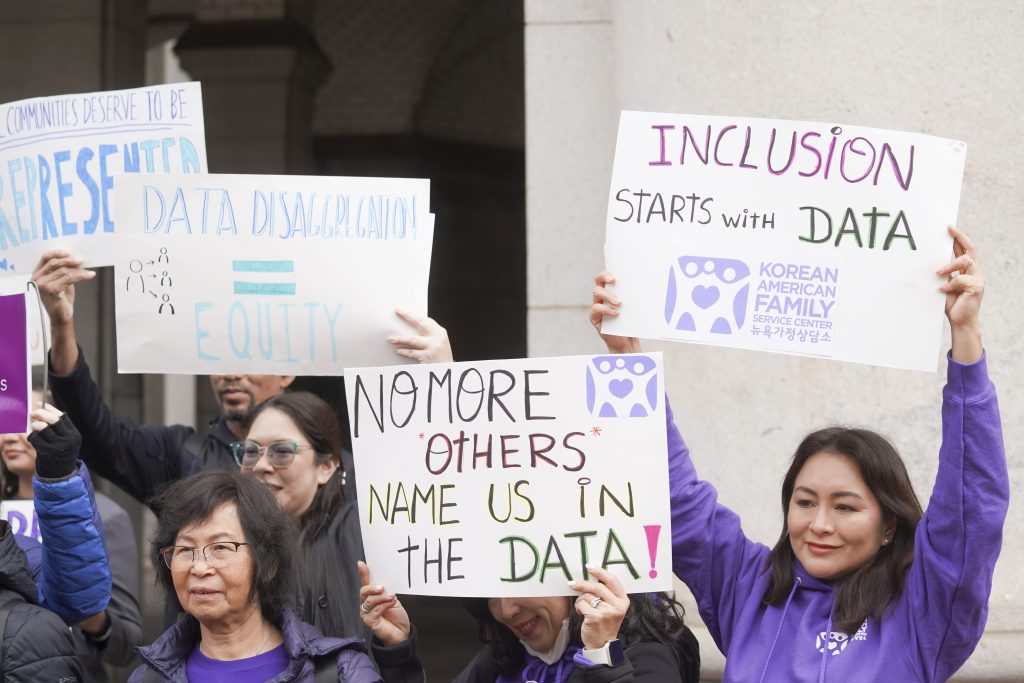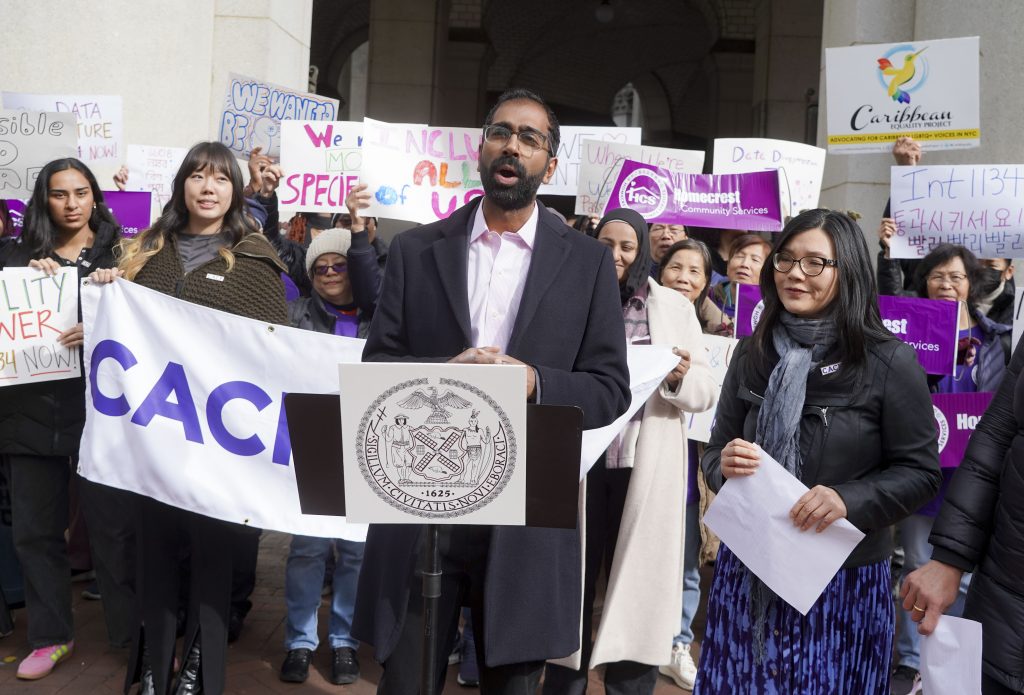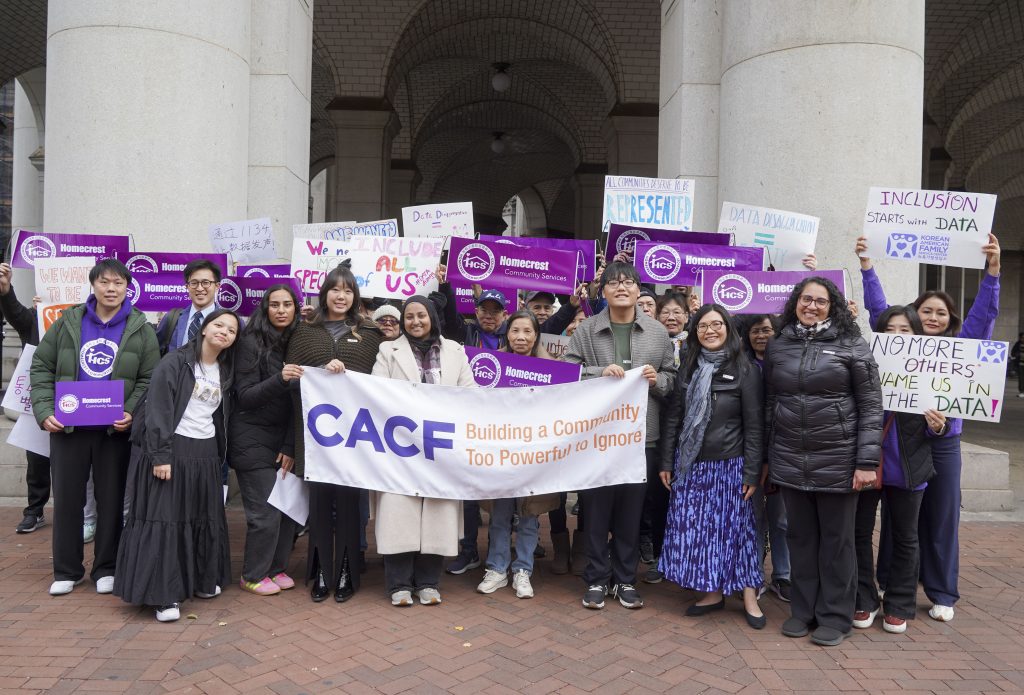
Courtesy CACF
NYC Approves Bill to Expand Race, Ethnicity Reporting
By MOHAMED FARGHALY
mfarghaly@queensledger.com
The New York City Council has passed a landmark bill aimed at improving how city agencies collect and report race and ethnicity data, a move advocates say will bring long-overdue visibility to communities that have been overlooked in public policy.
On October 29, the Coalition for Asian American Children and Families (CACF), Councilmember Shekar Krishnan, and leaders from CACF’s Invisible No More campaign gathered to celebrate the passage of Int. 1134, a measure approved by a 46-vote, veto-proof majority. The legislation establishes citywide standards for collecting disaggregated demographic data across seven of the city’s largest agencies, marking what supporters call a major step forward in representation and equity.
“For the first time, our city will require every major agency to collect and report disaggregated race and ethnicity data, making visibility a matter of law, not choice,” CACF said in a statement following the vote.
Under the bill, agencies will collect data on seven broad racial and ethnic categories — American Indian or Alaska Native, Asian, Black or African American, Hispanic or Latino, Middle Eastern or North African (MENA), Native Hawaiian or Pacific Islander, and White — while also requiring at least 12 detailed subgroups within each. The law further allows residents to self-identify using write-in options if existing categories do not reflect their background.

Councilmember Shekar Krishnan was the bill’s primary sponsor, joined by 18 co-sponsors including Alexa Avilés, Erik Bottcher, Tiffany Cabán, Carmen De La Rosa, and Lincoln Restler.
“New York City prides itself on being diverse, but we don’t have the data to back it. Our communities, especially our AAPI communities, are treated as a monolith. But after today, that will no longer be the case because the New York City Council is passing my legislation, Intro 1134, and putting an end to city agencies lacking data that is inclusive of the diversity of our city,” said Councilmember Shekar Krishnan, District 25.
Felicia Singh, Director of Policy and Government Relations at CACF, said the measure builds upon years of advocacy dating back to 2016, when Councilmember Daniel Dromm led the city’s first data disaggregation bill. “That was a really pivotal moment for our community, because it gave us the opportunity to really be seen by social services agencies in the city,” Singh said. “Before, they were pulling us into a monolith of being Asian or being pulled into white, if you were from the Middle Eastern, North African community.”
Singh said CACF began to notice city agencies were “not really adapting the law in any meaningful way” and approached Krishnan to strengthen the legislation. “This bill would again collect and report disaggregated race and ethnicity data. It is going to be a mandate, a requirement, and it lays the groundwork for future reforms,” she said.
Under Int. 1134, agencies can use voluntary survey forms or amend existing forms to align with the new standards. “They are also able to amend forms that already collect race and ethnicity demographic data and make sure that those forms are up to the standard of requiring at least 12 detailed subgroups for each category,” Singh explained.
Advocates say the reform will enable policymakers to better identify disparities in access to health care, education, housing, and social services. “The API community is not a monolith,” Singh said. “We’re not all pulled into Asian and identify in this way. This will allow city agencies to say, okay, yes, we serve the Asian community, but who among the Asian community actually has access to the needs of these services so much that they seek these services from these agencies, and then where are the gaps?”
The bill also codifies recognition of the MENA category — a change Singh said is especially meaningful. “We’re also going to be able to have our MENA community seen in the way that they want to be identified and not pulled into white,” she said. “For transnational folks, it’ll be able to still provide that information. If you are transnational, if you’re from the Guyanese community, the Trinidadian community, you’ll be able to write that in and still self-identify in that way as a recognized part of their data collection.”
Singh added that New York’s new system goes beyond federal standards, which still lump transnational and MENA communities into broad “other” or “white” categories. “It’s also a very progressive leap in comparison to the federal government’s standards for race and ethnicity,” she said.
The law’s implementation is expected to begin in 2026, with city agencies required to report and update data every two years. “We’re hoping all of 2026 will be like implementation,” Singh said. “It’s also going to be a potentially new administration, no matter what come November 4. So I think it’s really critical to see how our administration is going to support the implementation of this law.”
Despite the upcoming mayoral transition, Singh expressed confidence that Int. 1134 will become law regardless of political shifts. “We got a veto-proof majority, so that’s wonderful,” she said. “The mayor has a 30-day window to sign. If he does not do anything by the end of December 3, and if it ends up being unsigned, it will automatically be into law.”
Singh said the legislation represents “solidarity around why this was so important to our communities.” She praised Krishnan’s leadership and that of council members on the Government Operations Committee, including Chair Lincoln Restler, for championing the measure. “It demonstrated that you know what, we need to move our city forward in disaggregating the data that we have available, because it helps the City Council themselves serve New Yorkers better with this information,” she said. “So I think it’s a win-win for everyone.”
Singh added that the bill could become a model for other states seeking to advance data equity. “New York is the most progressive when it comes to data in a lot of different ways,” she said. “We’re seeing across the nation as CACF is seen across the nation as leaders in the movement for data equity.”



